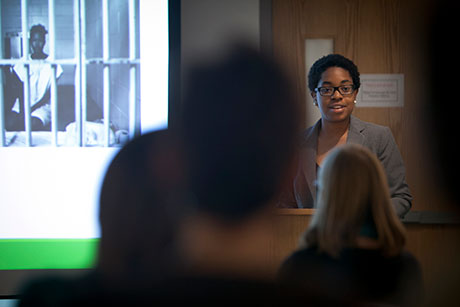Students 'delve deeper' into research topics, methods
By Daniel Aloi

When she saw gaps in research on the benefits and drawbacks of hotel managers responding to online reviews, hotel administration student Carly Andrews ’17 wanted to employ a better research model.
Some studies showed it was more harmful to respond – “it causes unrealistic expectations,” she said, even though “managers view it as the best way to get in touch with customers.”
Another survey of customer reviews used a limited sample of middle-aged women on Facebook. Andrews had no problems with the survey itself, but said, “I want to apply that to a specific hotel, and study a diverse sample of users … and do a better survey with different age groups [including] college students.”
She intends to use her Hunter R. Rawlings III Cornell Presidential Research Scholarship to continue the work through a hotel internship next spring, and publish the results before she graduates.
Andrews is one of 14 undergraduates who developed independent research projects this semester with tools gained in the Writing 2100 course Delve Deeper: Research Methods in the Humanities, Arts and Social Sciences.
The students gave their final presentations at a research forum May 13 in Kroch Library on such topics as immigration reform and labor in New York’s dairy industry, the Asian American “model minority” stereotype among Cornell students, and a study of women readers and literature from Dante to “chick lit.”
“You can tell they are passionate about their topics,” said co-instructor Kaila Bussert of Olin Library’s Research and Learning Services. “We saw them get a sense of the research process. We wanted them to open their minds to all kinds of research possibilities – in their travels, in their internships, in their courses.”
Taught in partnership with faculty members, research librarians, archivists and curators as mentors, the course places “a real focus on research in the humanities and social sciences, rather than specifically in the sciences,” said co-instructor Susette Newberry, assistant director of Research and Learning Services.
Now in its second year, the course was developed to teach sophisticated research skills to undergraduates, and to serve as a collaborative teaching and learning model.
The curriculum was also designed collaboratively, and included networking with faculty members, exploring information resources and finding research funding. Classes addressed primary sources, news and open access resources, ethnographic research, finding and analyzing humanities criticism, and legal and statistical research.
“We designed a lot of peer-learning opportunities for them,” Bussert said. “It was a well-integrated community. We provided chances to ask questions – they were always insightful questions – and [the students] received good ideas from their peers.”
Writing 2100 is the product of the Undergraduate Research Institute, an initiative created to prepare students in the humanities and social sciences as scholars, and take advantage of funded grant and fellowship opportunities, Newberry said.
Laura Brown, senior vice provost for undergraduate education, and Laurel Southard, director of undergraduate research, took part in planning the course with the instructors and other organizers. “The library collaborated with the Knight Institute for Writing in the Disciplines, the Johnson Museum, OADI [the Office of Academic Diversity Initiatives] and the Rawlings scholars program,” Newberry said.
Three of the students in the course are Rawlings scholars, 10 are OADI scholars and one is a Tanner Dean’s Scholar in the College of Arts and Sciences, Newberry said.
“Last year, there were Mellon-Mays Scholars Program applicants as well,” she said. “We’re hoping some of these students will apply for Mellon-Mays and other programs that support research in the humanities and social sciences.”
Media Contact
Get Cornell news delivered right to your inbox.
Subscribe